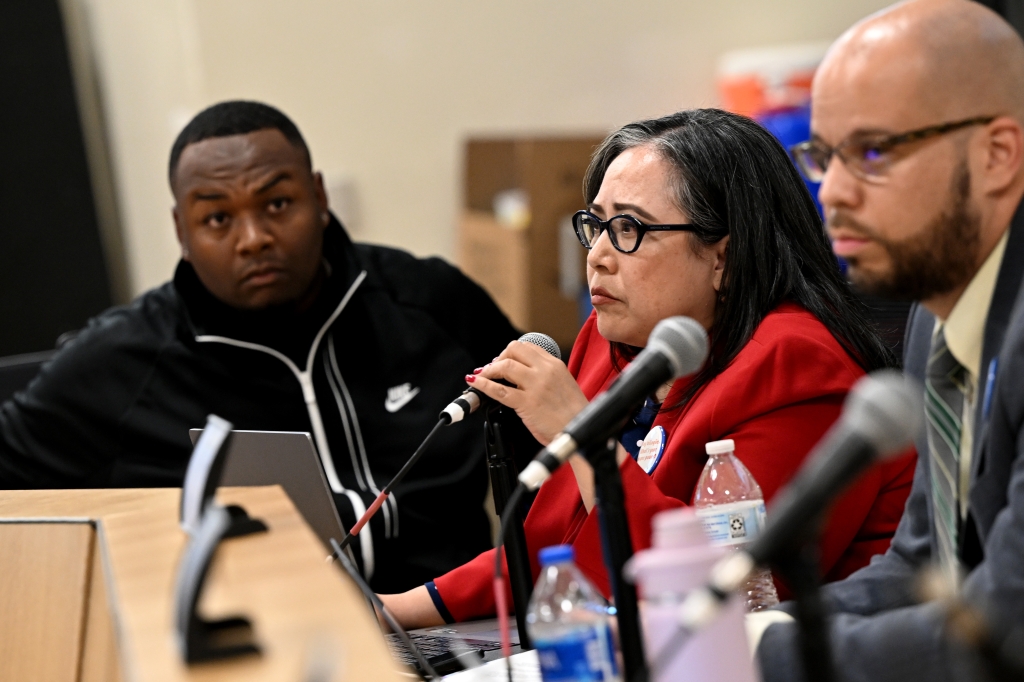
Denver school board reverses 2020 ban on armed police in schools
Last Updated on June 16, 2023 by Admin
[ad_1]

A divided Denver school board on Thursday reversed its 2020 policy prohibiting armed police on campuses, paving the way for officers’ long-term return in a move that capped months of debate over how to respond to the shooting inside East High School.
The seven-member board was split in its decision, voting 4-3 to reinstate school resource officers, or SROs, at Denver Public Schools following the temporary suspension of its ban earlier this spring.
In doing so, Colorado’s largest school district has joined a handful of others across the United States in rolling back policies enacted amid the national racial reckoning that occurred three years ago after the murder of George Floyd, a Black man, by a white police officer in Minneapolis.
The policy adopted on Thursday supersedes the board’s 2020 resolution and directs Superintendent Alex Marrero to enter into a memorandum of understanding with the Denver Police Department regarding the presence of officers on both district-run and charter school campuses.
Members who voted in favor of the new policy said it was not an easy decision, but they’ve heard from people in the community, including principals, who wanted officers to return to schools.
“There is a real fear and that sense of fear — we cannot ignore that,” said President Xóchitl “Sochi” Gaytán. “Whether this brings back this false sense of security or not, school leaders are asking us for that collaboration.”
But Board Vice President Auon’tai Anderson called the vote a “step back.”
“Taking out cops wasn’t a mistake,” he said.
Voting to allow SROs to return to schools means “supporting the status quo of white supremacy,” Anderson said ahead of the vote, adding, “It will come across as a statement that Black lives do not matter as much.”
The vote to reinstate SROs comes after a student shot and wounded two administrators inside East, the city’s largest high school, in March. That was one of two high-profile shootings to occur at the school this year — both of which came amid growing gun violence among Denver teens.
The school board temporarily allowed SROs to return to high schools following the March shooting, but the 2020 policy prohibiting officers was set to resume at the end of this month unless members acted.
Marrero previously had recommended that the board set a districtwide policy on police in schools. He is expected to release a new DPS safety plan in about two weeks.
Two of the board members — Scott Baldermann and Carrie Olson — who voted in favor of the policy that would allow the reinstatement of school resource officers were on the board in 2020 when directors decided unanimously to remove SROs. They were joined in their decision by Gaytán and Charmaine Lindsay.
Anderson, who led the push to remove SROs in 2020, voted against the policy. He and two other members — Michelle Quattlebaum and Scott Esserman — had proposed a policy change that would have kept the SRO prohibition in place and used community resource officers to respond when needed. The community resource officers would have been stationed in neighborhoods near schools rather than on the actual campuses.
School board members on both sides of the vote said SROs weren’t the only solution to rising youth gun violence and stressed the need to address root causes and for more mental health support.
“No matter how we vote here, I still don’t think we have gotten to the core issue in solving it,” Olson said.
Anderson has argued that officers would not have prevented the shootings at East. However, studies on the issue aren’t clear on whether SROs do or do not prevent such incidents.
Anderson, Esserman and others on the board have said having police in schools harms students of color and contributes to the school-to-prison pipeline, which happens when pupils become involved in the criminal justice system as a result of policies that use law enforcement to address behavioral issues.
“What are we going to do when (SROs) do harm?” Esserman asked his colleagues, adding, “The police system in America is designed to oppress.”
Studies have shown that there is an association between having police in schools and students of color facing disproportionately high rates of discipline, such as expulsions and arrests, compared to their white peers.
“Today is a really sad day for our community,” said Elsa Bañuelos-Lindsay, executive director of Movimiento Poder, which has advocated to end the over-policing of DPS students. “Because this means criminalizing our young people.”
School board members who voted in favor of reinstating SROs cited the rise in gun violence among teens and the increasing number of weapons being found on DPS campuses.
The number of firearms found in schools began increasing during the 2019-20 academic year, rising from two guns the previous year to 15. That number has remained steady since, with DPS discovering 16 guns in schools during the 2022-23 academic year, according to the latest data from the district.
And more fake guns are showing up in schools, too. DPS found 42 facsimile firearms last school year, up 50% from the 28 found the previous year, according to the data.
“This is about deterrence,” Baldermann said. “If it stops one kid from bringing a gun to school, it’s worth it.”
But Anderson pushed back on the statement, saying SROs haven’t prevented violence in the past.
“How many school shootings have been prevented by an SRO?” Anderson asked.
The new policy also says that DPS also must track when students are ticketed or arrested and give routine reports on such actions to the school board, according to the policy.
Get more Colorado news by signing up for our Mile High Roundup email newsletter.
[ad_2]
Source link




